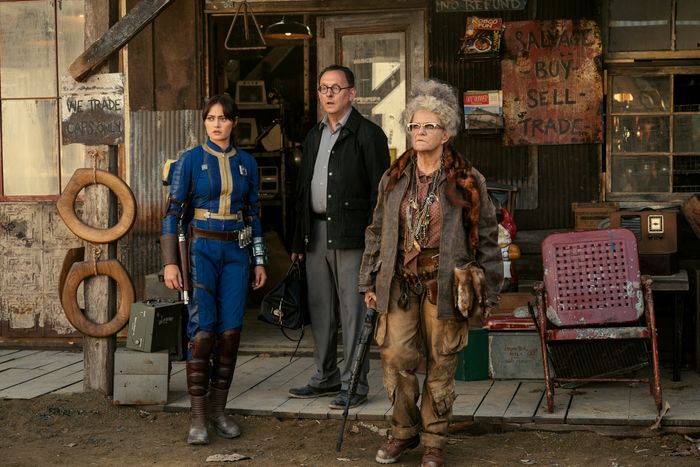
Fallout has all the hallmarks of contemporary Emmys bait: a call sheet studded with noms and winners of years past, a pair of buzzy executive producers, a Television Academy warmed to sci-fi and genre in recent years. But one thing stands in its way: Prime Video’s stubborn insistence on a binge episode-release strategy.
To binge-release or not has been debated for as long as streaming TV has existed, and at the Emmys, there are cases for and against it. The Crown has never suffered in the awards department for Netflix dropping entire seasons at once. Binge releasing has been Netflix’s calling card since the beginning, and the streamer has nabbed Outstanding Drama Series nominations for everything from Ozark to Bridgerton to Stranger Things. But The Crown’s 2021 victory remains the only Drama Series win for a binge release. For viewers (like me) who prefer a week-to-week release, this makes sense: “Appointment viewing,” while a steadily dwindling phenomenon, still gives shows more time to drive conversation, spark theories, and get viewers excited for each new episode. Series that have managed to merit Emmys drama distinction recently — Succession, The White Lotus, Game of Thrones, Better Call Saul — all followed the traditional weekly schedule. Streaming platforms have begun to get a taste for this as well; by the time shows like Severance (Apple TV+) and Andor (Disney+) reached their season finales, fans and critics alike had built up anticipation and hype for episode drops. Both were rewarded with Emmy nominations.
Prime Video’s Emmys success has mostly been relegated to the comedy categories, specifically The Marvelous Mrs. Maisel. Generally speaking, the comedy categories have been marginally friendlier to binge-release shows, considering the reigning champion, The Bear (FX’s baffling insistence on unleashing the show all at once is a topic for another newsletter). But the majority of Outstanding Comedy Series wins for streamers have still gone to weekly-release shows like Fleabag and Ted Lasso. In drama, Amazon has been nominated only once, for the second season of The Boys, a show that … moved from a binge drop to a week-to-week release in its second season. (It’s worth noting that while Mrs. Maisel enjoyed its best Emmys successes as a binge release in seasons one and two, the show did transition to weekly episode drops for its fourth and fifth seasons.) This year has the potential to be Prime’s best Emmys showing yet with both Fallout and Mr. & Mrs. Smith. Both shows were binge releases, and, I’d say, not coincidentally, both shows got a flash of publicity and chatter in the public square before the culture moved on to the next show it had to ingest in the span of a weekend. Meanwhile, say what you will about series like The Morning Show and The Gilded Age — they may be slowly unfolding car wrecks, but people do tune in every week for multiple weeks to rubberneck at the madness.
Fallout would have been an incredible show to follow week-to-week, full of twists and turns and fringe characters coming into their own. The postapocalyptic world-building, adapted from the popular video-game series by showrunners Graham Wagner and Geneva Robertson-Dworet and EPs Jonathan Nolan and Lisa Joy, feels like a snowball rolling downhill, picking up speed and substance as it goes. Fallout manages to blend the grimy, gloopy postnuclear world of giant bugs and blown-off limbs (the violence dovetails with a show like The Boys, lending Prime Video its first real sense of house style) with a sophisticated observation of the ways power and greed are hurtling us toward an endgame only the powerful and greedy can profit from.
Great performances more often than not need and deserve time to settle in, and Fallout has a few that should by all rights be in Emmys contention. Walton Goggins stands the best chance in Lead Actor; he’s the (ghoulish) face of the show, essentially plays two characters (even if they’re the same person), and is a former nominee for Justified. Elsewhere, Ella Purnell’s time on Yellowjackets could give her something of a “hey, we know you” boost in Lead Actress. In the supporting categories, Aaron Moten boasts the most screen time, though I wonder if the work he’s doing is too understated to make enough of an impression. Moisés Arias, as Purnell’s brother who gets left behind in the Vault to discover some dark secrets on his own, holds up an entire subplot, which ought to count for something. Sarita Choudhury appears in half of the season’s episodes, bumping her up to Supporting Actress status, though her dynamic performance really gets to blossom only in the season finale — she would have been a better contender in Guest Actress. Kyle MacLachlan and Emmy fave Michael Emerson will contend for Guest Actor. With the exception of Goggins, I’d say all these performances have longer odds at nominations than they should because only one month after the premiere of Fallout, nobody’s talking about it. This is basic marketing math, and Amazon keeps getting the equation wrong.
As for whether Fallout itself can find its way into a decidedly soft and squishy Outstanding Drama category, the answer is yes, it can. The Television Academy has been coming around to genre shows for the past several years. Everyone looks to Game of Thrones for opening the genre doors and The Handmaid’s Tale’s 2017 win for breaking ground for streaming series. But they had literary pedigree and Shakespearean themes of dynasty and betrayal, respectively. The Mandalorian, Severance, and The Boys, all recent Drama Series nominees, opened the doors for Fallout. Every one of those shows used a weekly episode release to build momentum, enthusiasm, and, most important, praise. The culture — awards voters included — needs time to acclimate to the idea that a show from an often junky genre is good. That takes time and repetitive praise. Netflix pulls this off with its binge releases because it has a massive user base (outpacing Amazon Prime Video by about 100 million users) and can employ those superior viewership numbers to bullhorn their way into the discourse. No other streamers have managed to succeed at this. But they succeed at the wars of attrition: another enthusiastic episode review for Andor, another round of Twitter discussion about this week’s Severance. Fallout could have used that kind of rollout. Now, it’s going to have to remind voters it exists all over again.


